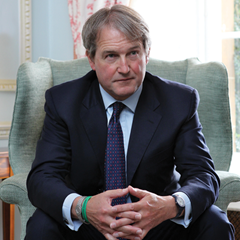Owen Paterson: a team effort to grow business
 Secretary of State Owen Paterson explains the Government’s approach to growing the private sector, points to Northern Ireland’s economic strengths and suggests how lower corporation tax could make them stronger.
Secretary of State Owen Paterson explains the Government’s approach to growing the private sector, points to Northern Ireland’s economic strengths and suggests how lower corporation tax could make them stronger.
I’m delighted to have been asked to write this introduction to the annual agendaNi economy report.
When I was appointed as Secretary of State in May 2010, I knew that rebalancing the Northern Ireland economy was one of our key priorities. Our goal is to help create a peaceful, stable and prosperous Northern Ireland with jobs and opportunities available for people right across the community. I am deeply committed to working with local business and the Northern Ireland Executive to achieve that.
This is very much a team effort. The Treasury consultation on rebalancing the Northern Ireland economy was the result of months of discussion and collaboration with Executive ministers and their officials. We needed to ensure that we had a shared understanding of the issues, including the estimated costs and benefits to the economy here of a reduction in the rate of corporation tax.
Northern Ireland has a great deal to offer; it is already an excellent location in which to do business. I’ve said frequently that we have many world-class businesses here in Northern Ireland – we just don’t have enough of them.
Kelvatek in Lisburn, is an indigenous engineering company exporting all over the world. When the Chancellor visited Northern Ireland in July we went to Wrightbus in Ballymena, who are exporting their high-tech buses to Hong Kong. They have achieved this because on quality they have simply outshone all their competitors worldwide. In addition, of course, they are building the new Routemaster for Transport for London, which will be in operation in time for the Olympic Games next year.
These success stories demonstrate the strengths of the economy. We have a well-educated, dynamic workforce, with innovation going on across a range of sectors. Northern Ireland has a history of manufacturing that is second-to-none and industries that are adapting to new global markets. We have two world-class universities, and superb communications infrastructure, including broadband links to the USA as good as any in Europe. There is also no doubt that relative to the Republic of Ireland and the rest of the UK, operating costs are highly competitive.
Northern Ireland also benefits from being an integral part of a major global economy which is mercifully outside the euro zone and where the structural deficit will be eliminated by the end of this Parliament. That has enabled market interest rates to stay low, to the benefit of everyone.
If the Northern Ireland economy is really going to take off, however, and the over-dependence on the public sector reduced, then we have to be radical. That is why I have been such an advocate of devolving powers over corporation tax to the Executive and Assembly here. I strongly believe that a reduced corporation tax rate would clearly signal to investors that Northern Ireland is open for business. Foreign investors could not afford to ignore Northern Ireland when thinking about where to locate their business. Getting our foot in the door with an attractive tax regime would allow Invest NI and private concerns seeking investment to showcase all the great things about doing business here.
We’ve had a great response to the Treasury consultation. The Government is going to consider those responses and we hope to be able to set out a way forward later in the year.
Of course, the Northern Ireland Executive has to play its part in those areas where competence is now totally devolved. One of the strengths of devolution is the ability of local ministers to determine local priorities, and to set budgets and policies according to those needs. While there are things that the Government can do at Westminster, issues such as education, skills, training, regional development and planning are all determined at Stormont. I know from my regular discussions with Executive ministers that they have these issues front and centre in their plans.
Politics here is more stable than it has been for decades. The people of Northern Ireland want to see their elected representatives focusing on the day-to- day issues that will improve the economic life of the country now and in future. I am convinced that a strong start has been made; my job as Secretary of State is to continue to ensure that we, as a government, support that process.





